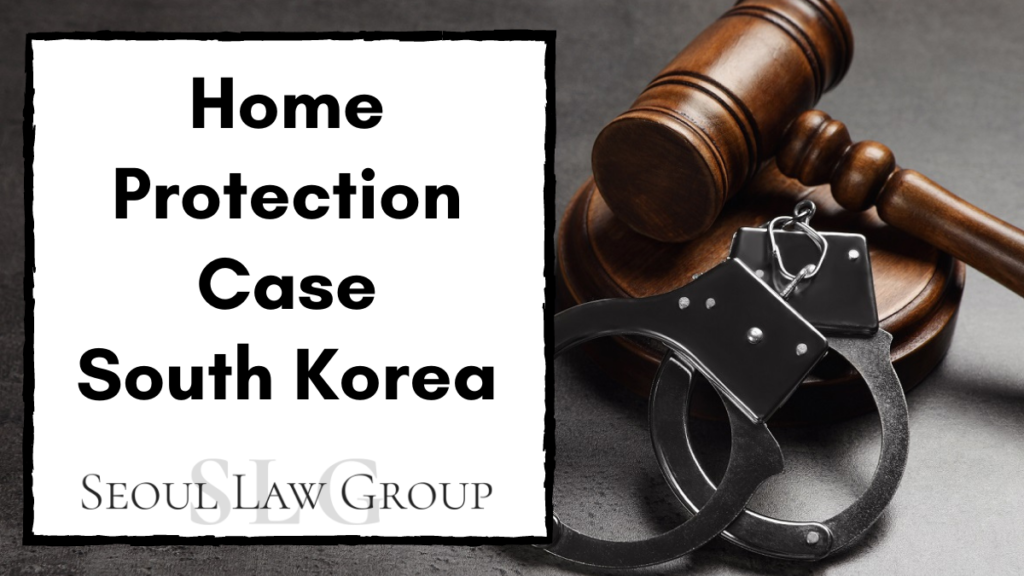Domestic crime is a complicated thing. Since the victim and the perpetrator are close families, sometimes the victim doesn’t want them to be punished, but rather just wants them to be taught some lesson so that they would stop committing such crime. This becomes a problem especially when the crime is a not very serious one.

Table of Contents
What is a Home Protection Case?
In this case, the victim can ask the prosecutor or the court in charge of the case, that they want this case to be handled as “Home Protection Case (가정보호사건)” instead of a normal criminal case. There are several conditions to be met in order to be home protection case. If you are victim of domestic violence in Korea and want help or need a divorce lawyer for ‘extreme maltreatment‘, don’t hesitate to contact Seoul Law Group.
1. Chingojoe or Banuisabulbeoljoe
First, the crime should be either “chingojoe (친고죄)” or “banuisabulbeoljoe (반의사불벌죄).” As you can see on the previous article, there are a few crimes in Korea called chingojoe, which means that they cannot be prosecuted without a complaint by the victim. There are also a few crimes in Korea called banuisabulbeoljoe, which means they cannot be punished against the victim’s will. The most common example of chingojoe is a crime of insult. The most common example of banuisabulbeoljoe is a crime of violence and intimidation.
2. Victim Doesn’t Want the Perpetrator to be Punished
Secondly, the victim should not want the perpetrator to be punished. If the crime is chingojoe, the victim should not press the charge at all, or even if they did, they should withdraw it later. If the crime is banuisabulbeoljoe, the victim should clearly indicate that they do not want the perpetrator to be punished, such as submitting the written opinion to the police or to the court.
If the case meets all the conditions above, and the prosecutor or the judge in charge of the case thinks it is better to treat this case as Home Protection Case, they would do it. The victim doesn’t have to worry “But what if the prosecutor or the judge rejects my opinion, and treat this as a normal criminal case?” because the law obliges the prosecutors and judges to “respect the opinions of the victims.”
Home Protection Case is handled by Family Court instead of the criminal court, which means the court doesn’t impose any punishment on the offender. Instead, they issue a “protective order” which would be any of the followings:
- Restrictions on offender’s access to the victims or family members
- Restrictions on offender’s access to the victims or family members through telecommunications
- Restrictions on offender’s exercise of parental authority over the victims, in case the offender is the victim’s parent
- Order for community service or a lecture
- Probation
- Entrustment of the custody of offenders to facilities
- Entrustment of the treatment of offenders to medical institutions
- Entrustment of the counseling for offenders to counseling centers
3. Protective Orders
It’s possible to issue several “protective orders” at the same time. But none of the “protective orders” can be longer than six months.
If the defendant doesn’t follow the “protective order,” the court would stop treating the case as Home Protection Case; now it becomes the normal criminal case. If the case was sent by the prosecutor, it would be sent back to that prosecutor, and if the case was sent by the judge of the criminal court, it would be sent back to that court.


I found the insights provided in this blog post on home protection to be incredibly informative and thought-provoking. The thorough analysis of case studies and practical recommendations underscore the Seoul Law Group’s commitment to offering valuable legal guidance. I look forward to reading more content from this esteemed source in the future.
We appreciate your gracious words, and we remain committed to continuous improvement. If you ever have any legal inquiries in the future, please do not hesitate to contact us at info@seoullawgroup.com. We are here to assist you with any questions or concerns you may have. Thanks you for your support.